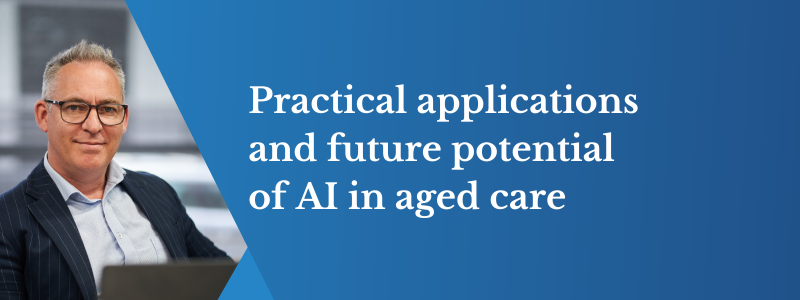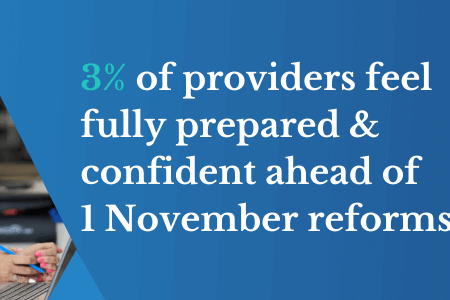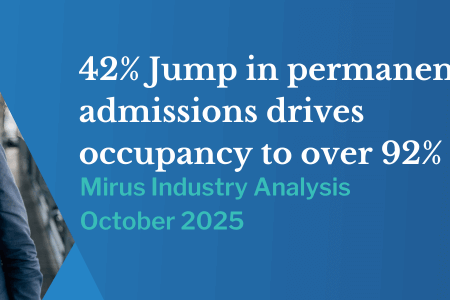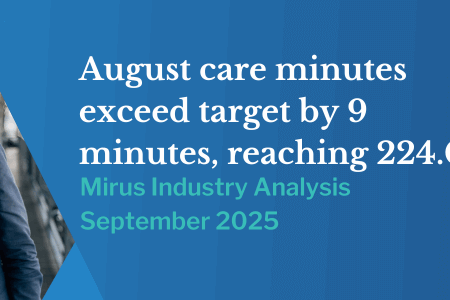How 3 aged care leaders are using AI in their businesses
June 13, 2024 | AI

By Andrew Farmer, CEO and Partner
Our May webinar on AI uses in aged care and home care featured a panel of industry leaders: Sue Thomson, Chief Executive Officer of Mclean Care, Phil Martin, Executive Director of Aged Care Services at MercyCare, and Justin Dover, Chief Executive Officer of Alino Living. The discussion centered on the current state of AI implementation in their organisations and the impact of these technologies on their operations, as well as a view to the future of AI in aged care. Here, we summarise the key points discussed by the panelists, highlighting the practical applications and future potential of AI in the sector.
What MercyCare, Alino Living and McLean Care are doing with AI
Phil’s perspective: Optimising operations and enhancing staff productivity
Phil detailed how MercyCare has initiated several projects that leverage AI to streamline various processes:
1. Optimise funding and enhancing resident care: MercyCare is participating in an AI research project in partnership with Mirus Australia, which aims to help optimise their AN-ACC funding, thereby enabling their clinical team to spend more time on resident care.
2. Route optimisation for staff scheduling: By replacing their home care software with a new AI-powered product, Mercy Care aims to optimise staff routes, ensuring efficient scheduling and reducing travel time.
3. AI policy and procedure chatbot: To assist front-line staff, Mercy Care is developing a chatbot that allows employees to query policies and procedures. This tool searches the database and provides relevant information, thereby saving time and improving compliance.
4. Multilingual avatars for training: Mercy Care is utilising avatars to deliver training sessions in multiple languages, reflecting the diversity of their team. This approach eliminates the need for hiring translators or actors, making training more accessible and cost-effective.
5. Automating administrative tasks: Phil shared a personal experience where AI significantly reduced the time required to prepare a board report. By using AI tools to summarise and analyse large datasets, Phil was able to produce a comprehensive report in just 90 minutes, a task that would typically take hours.
“It really is changing how I work”
-Phil Martin, Executive Director of Aged Care Services, MercyCare
Justin’s perspective: Streamlining data management and enhancing outcomes
Justin discussed the early stages of AI adoption at Alino living, focusing on how AI is being used to enhance data management and improve outcomes for residents and staff:
1. Automating data extraction and analysis: Justin’s team spends a significant amount of time extracting and analysing data from various systems. By automating these processes with AI, they aim to reduce manual labor and focus more on improving outcomes.
2. Ensuring data accuracy and reliability: One of the challenges Justin highlighted is the need to trust the data generated by AI models. While AI can significantly enhance efficiency, there is still a tendency to double-check the results. Building trust in these systems is crucial for fully leveraging their potential.
3. Focusing on workforce optimisation: Justin stressed that the goal of AI implementation is not to reduce wages but to use the existing workforce more effectively. By freeing up staff from mundane tasks, AI allows them to concentrate on delivering better care and services to residents.
“So for us, it’s really been about trying to find the way, like everyone struggling with staffing challenges with workforce trying to find the best way that we can use any sort of technology.”
-Justin Dover, CEO, Alino Living
Sue’s perspective: Innovating for better clinical outcomes
Sue highlighted how innovation is a cornerstone for her organisation, especially given the pressures of funding and operational requirements in smaller communities. While not all their technological advancements are strictly AI, they are laying the groundwork for more sophisticated AI applications:
1. Health offering as a workforce solution: McLean Care is at the intersection of technology and workforce solutions. They are developing algorithms within their platform to collect data, aiming to transition from a “stop and fix” model to one focused on prediction and prevention.
2. Predictive analytics for clinical outcomes: Sue emphasised the importance of being smarter about managing clinical outcomes for residents. The goal is to gather comprehensive data that can be analysed to predict and prevent health issues rather than just reacting to them.
3. Building a unified analytic framework: Currently, there are few programs that can integrate and analyse clinical data effectively. Sue hopes that by collecting and analysing more data, McLean Care will move towards predictive analytics more quickly, ultimately improving outcomes for their residents.
“We want to be a lot smarter in terms of how we manage our clinical outcomes for older people because at the end of the day, that’s what everybody wants …”
-Sue Thomson, CEO, Mclean Care
What the future of AI holds for these three providers
Sue’s vision: Critical technology adoption and Clinical governance
Sue emphasised that the adoption of technology, including AI, will be critical for her McLean Care’s future. However, she pointed out the importance of addressing the fear factor associated with AI and ensuring that technology supports existing workforces rather than replacing them. Sue highlighted the need for strong clinical governance models that support the adoption of technology, particularly AI, in delivering clinical services. She noted that there are currently no comprehensive clinical governance frameworks for AI in aged care, which McLean Care has had to develop on its own. Sue stressed the importance of governments helping to fund these technological advancements to ensure a sustainable future for digital health.
“Just in general, adoption take-up of technology is going to be critical. AI will definitely have to have a focus and I think one of the things that we probably don’t pay enough attention to when we look to things like this is that change methodology…”
-Sue Thomson, CEO, McLean Care
Justin’s vision: Efficiency gains and useful data
Justin identified efficiency gains as the primary focus for his Alino Living moving forward, especially given workforce issues. He emphasised the importance of collecting useful data and using AI to make more intelligent decisions around prediction and practice. Justin noted the need for effective communication and trust in AI systems. By ensuring that the data collected is used effectively, Alino aims to improve resident outcomes and streamline operations. The flexibility of AI to adapt to new regulations and changes in the sector is also a critical aspect that Justin’s organisation is focusing on.
“The exciting part for me is that it’s going to unleash the staff. More on the floor, being able to do more things that improve the lives of the residents. And that’s the key to all of it.”
-Justin Dover, CEO, Alino Living
Phil’s vision: Technology integration and staff empowerment
Phil described how his team embraces new technology across various aspects of their operations, from recruitment to improving resident safety and lifestyle. He highlighted the integration of motion sensors and smart technology in their new homes, which enhances resident safety and staff efficiency. Phil emphasised the importance of protecting resident privacy by using sensor technology only, not cameras, while leveraging AI to provide timely and accurate alerts to notify staff if a resident requires assistance. He also discussed the potential of AI in staff education, adapting to individual learning styles, and incorporating virtual reality into training. Phil envisioned AI playing a significant role in clinical monitoring and decision-making, ultimately leading to better care outcomes and more efficient use of resources.
“We held a brainstorming session and we’ve identified 31 ideas or areas that AI can help us with and that list ranges from using AI to help screen potential candidates during our recruitment process right through to improving asset lifecycle of unutilised assets and automating maintenance.”
-Phil Martin, Executive Director of Aged Care Services, MercyCare
The panelists collectively highlighted the transformative potential of AI in aged care and home care. As AI technologies continue to evolve, they offer numerous opportunities to improve efficiency, enhance care quality, and streamline operations. However, it is essential to approach AI implementation thoughtfully, ensuring that these technologies are used to augment human capabilities and deliver tangible benefits to both staff and residents.
As we look to the future, the integration of AI into clinical processes in aged care and home care is expected to become increasingly sophisticated. Organisations that embrace these innovations and invest in building trust in AI systems will be well-positioned to lead the way in providing high-quality, efficient care.
If you’re ready to get started on your AI journey, talk to us about Mirus AI.


